TO
| Creator | Title | Description | Subject | Date | ||
|---|---|---|---|---|---|---|
| 1 |
 | Codding, Brian F. | A land of work: foraging behavior and ecology | Work is a core theme in many of the major issues and debates in California archaeology. Work is central in understanding why the first Californians entered the region (e.g., Erlandson, this volume): how thousands of years of work following colonization resulted in the overexploitation of particular ... | Human behavioral ecology; Hunter-gatherer; North America; California | 2012-03-15 |
| 2 |
 | Codding, Brian | Alternative aboriginal economies: Martu livelihoods in the 21st century | In the western deserts of Australia, hunting and gathering endures as an important social and economic activity. That foraging persists within the boundaries of developed industrialized nation states may come as a surprise to those who evaluate foraging as less profitable than agricultural, wage or ... | Aboriginal economics; Aboriginal foraging | 2015 |
| 3 |
 | Hawkes, Kristen | Alyawara plant use and optimal foraging theory | Various authors have remarked on the importance of seeds in the pre-European diet of central Australian Aborigines. The Alyawara, an Arandic-speaking group, were typical in this respect. They collected edible seeds from nearly half the eighty-five plant species in their traditional subsistence inven... | Australia; aborigines; foraging; seeds | 1981 |
| 4 |
 | Miller, Jan D. | Anisotropic character of talc surfaces as revealed by streaming potential measurements, atomic force microscopy, and molecular dynamics simulations | A study of the interfacial properties of the basal plane and the edge surfaces of talc is described in this paper. The isoelectric-point measured at the two different crystallographic planes by the streaming potential method was found to be similar and exists at about pH 3.0. In the case of the edg... | Streaming potential; Scanning electron microscope; Atomic force microscope | 2006 |
| 5 |
 | Davidson, Diane W. | Ant-plant symbioses in Africa and the neotropics : history, biogeography and diversity | Symbiotic ant-plant relationships afford an excellent opportunity to analyze the effects of both historical and ecological factors on the evolution of mutualisms. Occurring in tropical forests throughout the world, all myrmecophytic plants provide food and permanent housing to ants; the ants, in t... | Ant-plant symbiosis; Africa; Neotropics; Myrmecophytes; Plant-ants | 1993 |
| 6 |
 | McDaniel, Susan | Approche sociologique feministe pour l'ettude de la fecondite. | L'essor d'une perspective feministe de la fecondite provient de plusieurs endroits et se situe a des niveaux varies. Avant d'esquisser ceux qui serviront de base aux discussions de ce chapitre, une breve histoire de ce contexte parait de mise. Il y a une vingtaine d'annees, alors que les sciences... | Fecundity; Feminist sociology | 1995 |
| 7 |
 | Miller, Jan D. | Arsenic removal from contaminated waters | Arsenic is a contaminant at 781 of 1,430 sites identified on the National Priorities List and in mining and mineral processing wastewaters, smelter wastes, and sites for manufacture of semiconductors, petroleum products, wood preservatives, animal feed additives, and herbicides. Arsenic affects abo... | arsenic; arsenate; arsenite; microbial; activated carbon; magnetic activated carbon; biomac | 2005 |
| 8 |
 | Gardner, Reed M. | Artifact Detection and Elimination in Intensive Care Pressure Monitoring Systems | Biomedical Informatics | 1983 | |
| 9 |
 | Miller, Jan D. | Atomic force microscopy investigation of interaction forces between polyethylene and asphaltene surfaces | Many petroleum-derived asphalts used for road construction exhibit poor rheological properties. These properties of asphalt can be improved by addition of various polymer fillers to the asphalt blend. Recycled polyolefines, especially polyethylene and polypropylene have been used as the asphalt mo... | asphalt; rheology; polyolefins | 2006 |
| 10 |
 | Yaffe, Joanne | Behaviorism, social learning, and exchange theory | Behaviorism focuses on learning and the way in which behavior is shaped by its antecedent conditions and consequences. In rejecting mentalistic constructs such as mind, consciousness, and other internal processes, behaviorism stresses the importance of studying observable behavior rather than pheno... | 2006 | |
| 11 |
 | Olivera, Baldomero M. | Biochemical studies of ω-conotoxin GVIA; a peptide toxin inhibiting voltage-sensitive Ca++ channels | The fish-hunting cone snails use their venom to quickly paralyze their more agile prey. In the last few years, our laboratories have carried out a program of analyzing biologically active components present in the fish-hunting cone snail venoms (Cruz et al. 1985; Olivera et al. 1985). We have concen... | Conotoxins; Calcium channels; Conus geographus; Venom | 1987 |
| 12 |
 | Seger, Jon; Davidson, Diane W. | Biological richness of deserts | A desert is "waterless," "treeless," "barren," "remote," "uninteresting," and "presumably uninhabited," according to the authoritative Oxford English Dictionary. The word is derived from deserere, a Latin verb meaning "to leave." In English, to desert is still to "abandon," "forsake," or "fail." Bec... | Desert life; Desert biodiversity | 1995 |
| 13 |
 | Clayton, Dale H. | Biology, ecology, and evolution of chewing lice | Chewing lice are small, dorsoventrally compressed insects and are parasites of virtually all birds (Fig. 1) and some mammals (Fig. 2). Many chewing lice are host specific, being found on only a single species of host. All chewing lice are permanent ectoparasites and complete their entire life c... | Chewing lice | 2003 |
| 14 |
 | Gardner, Reed M. | Blood Pressue Monitoring | Biomedical Informatics | 1998 | |
| 15 |
 | Ehleringer, James R. | Burning coal seams in southern Utah: a natural system for studies of plant responses to elevated CO2 | In the Burning Hills and Smoky Mountains of southern Utah (USA), coal deposits exposed to the surface have been ignited by lightning and have been burning for periods of years to over a century. We examined one of these sites, where the below-ground combustion of this low-sulfur coal releases gases ... | Coal fires; Elevated CO2; Isotope ratios; Atriplex confertifolia; Salsola iberica; Gutierrezia sarothrae | 1997 |
| 16 |
 | Keller, Tawnya Mosier; Myntti, Jeremy | Chapter 9: "What were we thinking?" Successes and lessons learned after going live with our digital preservation program | The J. Willard Marriott Library at the University of Utah began to seriously investigate preserving its digital assets in 2008 and went live with a digital preservation system (DPS) in 2014. This chapter serves as a case study of the library's overall digital preservation program, and discusses the ... | Digital preservation; Higher education programs; Workflow | 2019 |
| 17 |
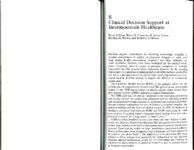 | Haug, Peter J. | Clinical Decision Support at Intermountain Healthcare | Biomedical Informatics | 2007 | |
| 18 |
 | Clayton, Dale H. | Coevolutionary history of ecological replicates: comparing phylogenies of wing and body lice to Columbiform hosts | Phylogenies depict the history of speciation for groups of organisms. Comparing the phylogenies of interacting groups can reveal instances of tandem speciation, or "cospeciation" (Brooks and McLennan, 1991; Hoberg et al., 1997; Paterson and Gray, 1997). Understanding the conditions under which cosp... | Feather lice; Wing lice; Body lice; Cospeciation | 2003 |
| 19 |
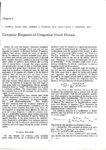 | Warner, Homer R. | Computer Diagnosis of Congenital Heart Disease | Biomedical Informatics | 1968 | |
| 20 |
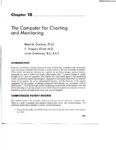 | Gardner, Reed M. | The Computer for Charting and Monitoring | Biomedical Informatics | 1993 | |
| 21 |
 | Gardner, Reed M. | Computerization and Quality Control of Monitoring Techniques | Biomedical Informatics | 1991 | |
| 22 |
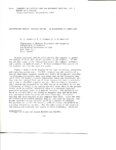 | Gardner, Reed M. | Computerized Medical Decision-Making - An Evaluation in Acute Care | Biomedical Informatics | 1982 | |
| 23 |
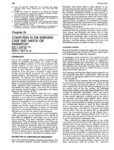 | Gardner, Reed M. | Computers in the Intensive Care Unit Match or Mismatch | Biomedical Informatics | 1989 | |
| 24 |
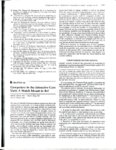 | Gardner, Reed M. | Computers in the Intensive Care Unit: A Match Meant To Be! | Biomedical Informatics | 1995 | |
| 25 |
 | Seger, Jon | Conditional relatedness, recombination, and the chromosome numbers of insects | If two polymorphic loci are out of phase equilibrium, a homozygote at one of these loci is more highly related to its kin, at the other locus, than is an equivalent heterozygote. As a result, selection can favor (1) phenotypic responses to relative heterozygosity, and (2) increased recombination bet... | Coefficients of relatedness; Conditional relatedness | 1983 |
